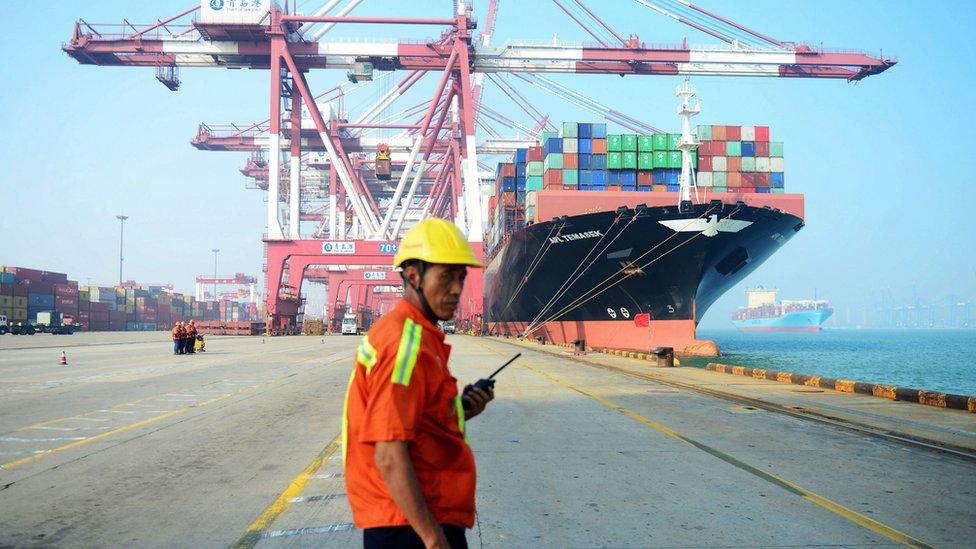Trump delays some tariffs on Chinese imports
- Published

The US is delaying imposing tariffs on some imports from China until 15 December because of "health, safety, national security and other factors".
The products include mobile phones, laptops, video game consoles, some toys, computer monitors, and certain footwear and clothing.
office sparked a rally in share prices.
Other items facing a 10% tariff will go ahead as planned on 1 September.
US President Donald Trump, speaking to reporters, said that the delay was in part to avoid hitting US shoppers this Christmas.
The USTR's announcement was released minutes after China's Ministry of Commerce said Vice Premier Liu He had conducted a phone call with US trade officials.
Technology investors welcomed news of the exemptions, pushing an index of chip stocks up 2.8%. Retailers and industrial shares also rose, with General Electric up 4.4%.
On Wall Street, the three main share indexes were up more than 2% at one stage. The Dow Jones and S&P 500 finished 1.4% ahead, while the tech-dominated Nasdaq finished up 1.9% - led by a 4% rise in Apple.
In the UK, stocks exposed to global trade also rose, with miner Glencore closing up 2.3%.
Mr Trump said on 1 August he would impose a 10% tariff on $300bn of Chinese goods, blaming China for not following through on promises to buy more American agricultural products.
He also personally criticised Chinese President Xi Jinping for failing to do more to stem sales of the synthetic opioid fentanyl amid an opioid overdosing crisis in the US.
But in a tweet on Tuesday, Mr Trump hinted that he was expecting something in return, suggesting that China's failure to "buy big" from US farmers could be about to change.
The USTR's announcement comes amid growing concerns about a global economic slowdown. Goldman Sachs said on Sunday that fears of the US-China trade war leading to a recession were increasing.
Some analysts said Tuesday's delay does not mean the trade war is over. Elena Duggar, associate managing director at credit rating agency Moody's, said: "This seeming de-escalation in ongoing tensions may be a temporary reprieve... Relations between the world's two largest economies will remain contentious, punctuated with occasional steps towards compromise."
Earlier on Tuesday, China's chief trade negotiators, Vice Premier Liu He and Commerce Minister Zhong Shan, spoke to their US counterparts, Treasury Secretary Steven Mnuchin and Trade Representative Robert Lighthizer.
The Xinhua news agency said that the Chinese officials issued "a solemn protest" against the punitive duties set to come into effect on 1 September. Mr Lighthizer and Mr Liu have scheduled another telephone call in two weeks.
The two sides were due to hold another round of meetings in Washington in September, but the deterioration in relations in the past two weeks cast doubt on whether the talks would take place.
Additional details and lists of the specific product types affected by the announcement are due to be published by USTR later.
- Published16 January 2020